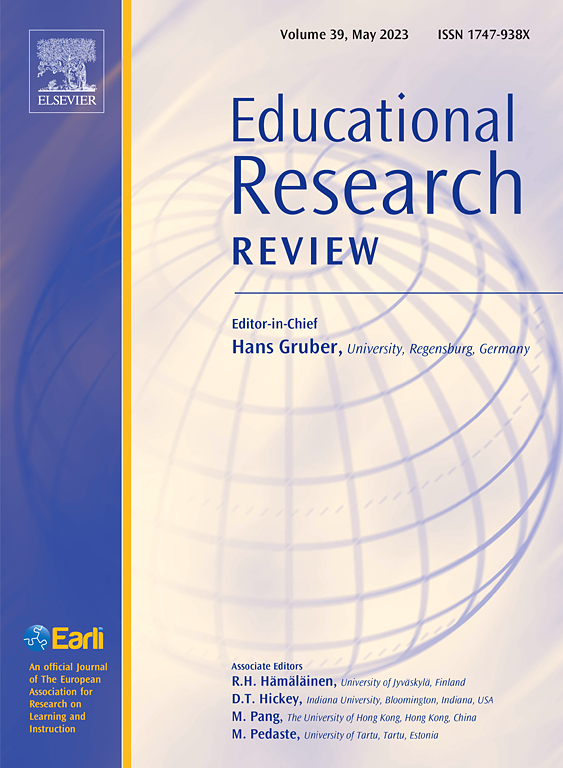Navigating the double-edged sword: A meta-analysis of the effects of digital games on 21st century skills
IF 10.6
1区 教育学
Q1 EDUCATION & EDUCATIONAL RESEARCH
引用次数: 0
Abstract
Digital games are a double-edged sword; while they may pose potential negative effects for players, they are also recognized as valuable tools for fostering 21st century skills. Although 21st century skills have been widely promoted, this is the first meta-analysis to examine the effects of digital games on 21st century skills, specifically focusing on all 4C skills: critical thinking, creativity, collaboration, and communication. Drawing on 50 effect sizes from 37 studies, the results indicate: (a) digital games have a positive, medium overall effect on 21st century skills (g = 0.55); (b) digital games have a large effect on critical thinking (g = 0.85), a medium effect on communication (g = 0.77), and small effects on collaboration (g = 0.41) and creativity (g = 0.37); (c) moderator analysis has identified factors including targeted disciplines, game type, online status, experimental design, sample size, grade level, and type of control group as moderators of the effects of digital games on 21st century skills. This study highlights the importance of integrating digital games into education, suggesting that game design should prioritize critical thinking and communication as key objectives, while also incorporating activities that promote collaboration and creativity. It further underscores the urgent need for a unified scale to assess 21st century skills.
驾驭双刃剑:数字游戏对21世纪技能影响的元分析
数字游戏是一把双刃剑;虽然它们可能会给玩家带来潜在的负面影响,但它们也被认为是培养21世纪技能的宝贵工具。虽然21世纪技能已经得到了广泛的推广,但这是第一次检验数字游戏对玩家21世纪技能影响的荟萃分析,特别关注所有4C技能:批判性思维、创造力、协作和沟通。根据37份出版物的50个效应大小,结果表明:(a)数字游戏对21世纪技能具有积极的中等总体影响(g = 0.55);(b)数字游戏对批判性思维的影响较大(g = 0.85),对沟通的影响中等(g = 0.77),对协作(g = 0.41)和创造力的影响较小(g = 0.37);(c)调节因子分析确定了目标学科、游戏类型、在线状态、实验设计、样本量、年级水平和对照组类型等因素作为数字游戏对21世纪技能影响的调节因子。该研究强调了将数字游戏整合到教育中的重要性,表明游戏设计应该优先考虑批判性思维和沟通作为关键目标,同时还应纳入促进合作和创造力的活动。报告进一步强调,迫切需要一个统一的量表来评估21世纪的技能。
本文章由计算机程序翻译,如有差异,请以英文原文为准。
求助全文
约1分钟内获得全文
求助全文
来源期刊

Educational Research Review
EDUCATION & EDUCATIONAL RESEARCH-
CiteScore
19.40
自引率
0.90%
发文量
53
审稿时长
57 days
期刊介绍:
Educational Research Review is an international journal catering to researchers and diverse agencies keen on reviewing studies and theoretical papers in education at any level. The journal welcomes high-quality articles that address educational research problems through a review approach, encompassing thematic or methodological reviews and meta-analyses. With an inclusive scope, the journal does not limit itself to any specific age range and invites articles across various settings where learning and education take place, such as schools, corporate training, and both formal and informal educational environments.
 求助内容:
求助内容: 应助结果提醒方式:
应助结果提醒方式:


